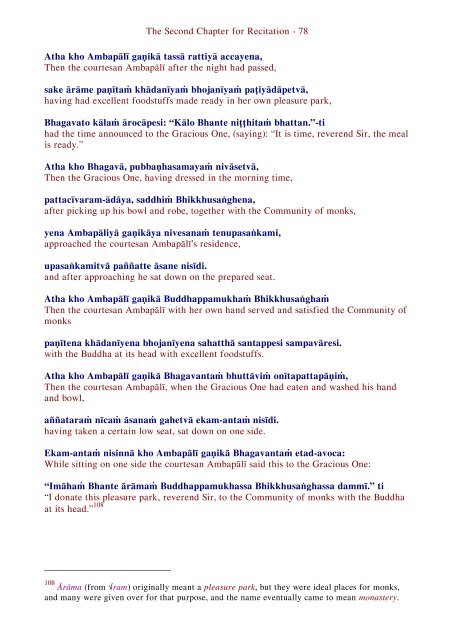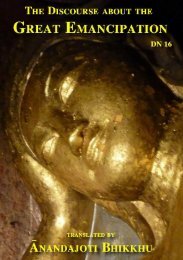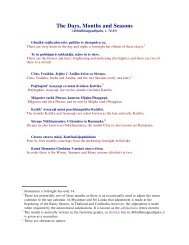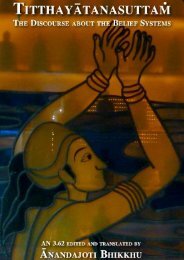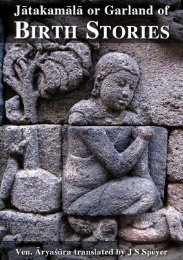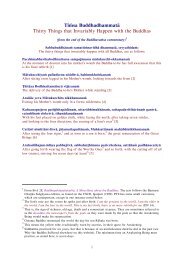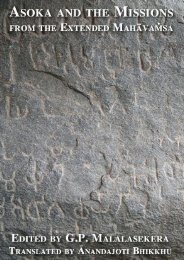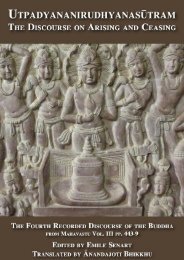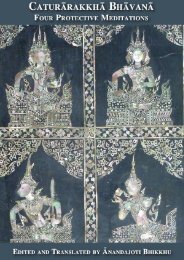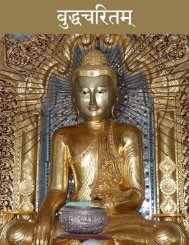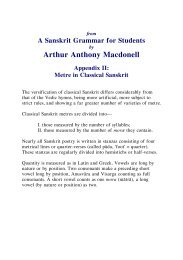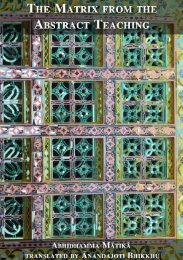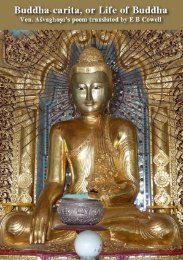Mahaparinibbanasuttam (DN 16) - Ancient Buddhist Texts
Mahaparinibbanasuttam (DN 16) - Ancient Buddhist Texts
Mahaparinibbanasuttam (DN 16) - Ancient Buddhist Texts
Create successful ePaper yourself
Turn your PDF publications into a flip-book with our unique Google optimized e-Paper software.
The Second Chapter for Recitation - 78<br />
Atha kho Ambapālī gaṇikā tassā rattiyā accayena,<br />
Then the courtesan Ambapālī after the night had passed,<br />
sake ārāme paṇītaṁ khādanīyaṁ bhojanīyaṁ paṭiyādāpetvā,<br />
having had excellent foodstuffs made ready in her own pleasure park,<br />
Bhagavato kālaṁ ārocāpesi: “Kālo Bhante niṭṭhitaṁ bhattan.”-ti<br />
had the time announced to the Gracious One, (saying): “It is time, reverend Sir, the meal<br />
is ready.”<br />
Atha kho Bhagavā, pubbaṇhasamayaṁ nivāsetvā,<br />
Then the Gracious One, having dressed in the morning time,<br />
pattacīvaram-ādāya, saddhiṁ Bhikkhusaṅghena,<br />
after picking up his bowl and robe, together with the Community of monks,<br />
yena Ambapāliyā gaṇikāya nivesanaṁ tenupasaṅkami,<br />
approached the courtesan Ambapālī’s residence,<br />
upasaṅkamitvā paññatte āsane nisīdi.<br />
and after approaching he sat down on the prepared seat.<br />
Atha kho Ambapālī gaṇikā Buddhappamukhaṁ Bhikkhusaṅghaṁ<br />
Then the courtesan Ambapālī with her own hand served and satisfied the Community of<br />
monks<br />
paṇītena khādanīyena bhojanīyena sahatthā santappesi sampavāresi.<br />
with the Buddha at its head with excellent foodstuffs.<br />
Atha kho Ambapālī gaṇikā Bhagavantaṁ bhuttāviṁ onītapattapāṇiṁ,<br />
Then the courtesan Ambapālī, when the Gracious One had eaten and washed his hand<br />
and bowl,<br />
aññataraṁ nīcaṁ āsanaṁ gahetvā ekam-antaṁ nisīdi.<br />
having taken a certain low seat, sat down on one side.<br />
Ekam-antaṁ nisinnā kho Ambapālī gaṇikā Bhagavantaṁ etad-avoca:<br />
While sitting on one side the courtesan Ambapālī said this to the Gracious One:<br />
“Imāhaṁ Bhante ārāmaṁ Buddhappamukhassa Bhikkhusaṅghassa dammī.” ti<br />
“I donate this pleasure park, reverend Sir, to the Community of monks with the Buddha<br />
at its head.” 108<br />
108 Ārāma (from √ram) originally meant a pleasure park, but they were ideal places for monks,<br />
and many were given over for that purpose, and the name eventually came to mean monastery.


